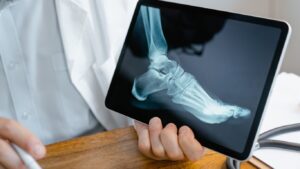Tips to Improve Your Orthopedic Health for Life.
It’s important to take care of your body for long-term well-being, whether you want to prevent injuries, manage existing conditions, or just keep your bones and joints in great shape. Orthopedic health affects everything from how you move to your overall quality of life, so it’s important to maintain strong and healthy bones, muscles, and joints for an active and pain-free life. These 10 easy tips will help you improve and maintain your orthopedic health for life.
Improve Your Orthopedic Health
1.Maintain Your Activity Level with Frequent Exercise.
Exercise is essential for keeping bones, joints, and muscles in good condition. Regular physical activity increases general flexibility and strengthens the muscles supporting your joints. Walking, swimming, and cycling are examples of weight-bearing activities that are especially good for bone health and can help prevent osteoporosis. To keep your body in optimal condition, try to get in at least 30 minutes of moderate exercise most days of the week.
2.Preserve a Healthy Weight.
Carrying too much weight strains your joints, particularly the lower back, hips, and knees. The chance of developing chronic orthopedic problems and joint discomfort might be decreased by maintaining a healthy weight. You can reach and maintain your target weight with a healthy diet and consistent exercise. This helps avoid ailments like arthritis and back discomfort in addition to enhancing joint health.
3.Be Aware of Your Posture.
Preventing musculoskeletal pain and preserving spinal health are greatly aided by proper posture. When sitting, standing, or walking, slouching or having bad posture can cause discomfort and long-term problems including persistent neck or back pain. Pay attention to how you carry your bags, stand when cooking, and sit at your desk. To keep your posture neutral and upright throughout the day, use ergonomic chairs and take brief pauses.
4.Include Stretching and Flexibility.
Maintaining muscle balance and joint flexibility requires stretching. Stretching on a regular basis can help avoid injuries and stiffness, especially as we age. Your muscles can remain long and flexible with easy stretches like light calf and hamstring stretches. Stretching both before and after physical activity helps your body get ready and speed up your recuperation.
5.Purchase supportive shoes.
Wearing appropriate footwear is essential for your orthopedic health because your feet serve as the basis of your body. Plantar fasciitis, bunions, and back discomfort can be avoided with shoes that offer enough arch support, cushioning, and perfect alignment. Shoes that are overly high-heeled or flat should be avoided since they can cause your body to become misaligned. See a podiatrist if you’re not sure which shoes are appropriate for your feet.
6.Prioritize Bone Health with Diet
The cornerstone of good orthopedic health is strong bones. Getting the proper nutrition is crucial to maintaining strong bones throughout your life. The minerals calcium, vitamin D, and magnesium are essential for healthy bones. To promote bone strength, include foods like dairy, leafy greens, fatty salmon, and fortified cereals in your diet. Consult your physician about potential supplements if you’re worried about your diet.
7.Use safe lifting techniques.
Serious injuries can result from improper lifting practices, especially to the shoulders, neck, and back. When carrying large goods, always keep your back straight and bend at the knees. When lifting, lift with your legs rather than your back, and do not twist your torso. Never be afraid to ask for assistance or make use of assistive equipment, such as a lift or dolly, if anything is excessively heavy. One of the most important aspects of orthopedic health is protecting your spine from strain.
8.Take Regular Sitting Breaks
Long-term sitting can have a detrimental effect on your posture and general joint health, especially in the knees, hips, and back. Make it a practice to get up, stretch, and move around every half hour if you work a desk job. Simple exercises like stretching or going for a walk to fetch a drink will help reduce stiffness and increase circulation, which can support improved orthopedic health over the long run.
9.Sleep Enough to Recuperate
Your body can heal itself overnight with the help of sleep, which is crucial for the rehabilitation of your muscles and joints. While a good night’s sleep aids in the recovery of your muscles and joints after everyday activities, a lack of sleep can exacerbate pain and inflammation. Try to get between seven and nine hours of good sleep every night. Invest in a high-quality mattress and pillow to promote spinal alignment and ease discomfort as you sleep.
10.Routine examinations by an orthopedic specialist
Seeing an orthopedic specialist on a regular basis is a terrific approach to take charge of your health. If you have stiffness or pain in your muscles, joints, or spine, an orthopedic specialist can assess you thoroughly and suggest a course of treatment. Minor problems can be avoided from becoming large ones with early attention. You can maintain healthy bones and joints for the rest of your life with routine checkups.
Conclusion
Your general well-being is greatly influenced by your orthopedic health. You may enhance the health of your bones, muscles, and joints by following these ten easy steps, which will keep you pain-free and active for many years to come. To experience long-term orthopedic health, start implementing these routines into your everyday life and take proactive measures to care for your body.

